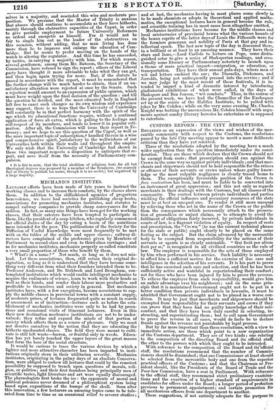MECHANICS INSTITUTES.
LArnABLE efforts have been made of late years to instruct the working classes and to increase their comforts, by the classes above them. In addition to the oldfashioned agencies of gregarious benevolence, we have had societies for publishing cheap books, associations for promoting mechanics institutes, and statutes to compel railway companies to provide cheap conveyances for the million. In fact, so many nice things have been got for the working classes, that their caterers have been tempted to participate in them, like the president of a soup-kitchen, who regularly commenced her official duties of the day by eating a basin of the nutritious mess intended for the poor. The publications of the Society for the Diffusion of Useful Knowledge were most frequently to be met with on the tables of the middle and upper classes; railway di- rectors have complained of the preference given by Members of Parliament to second-class and even to third-class carriages ; and as for mechanics institutes, mechanics properly so-called constitute a very small proportion of those who benefit by them. "What's in a name ? " Not much, so long as it does not mis- lead. Let these associations, then, still retain their original de- signation, so long as it is understood that they have become some- thing very different from what their founders intended them to be. Professor Anderson, and Dr. Birkbeck and Lord Brougham, con- templated institutions which would enable intelligent mechanics to acquire the rudiments of science, learn to work with their heads as well as their hands, and render their labour more productive and profitable to themselves and society in general. :But mechanics institutes have, with a few exceptions, become associations to sup- ply the middle classes in provincial towns with a constant supply, at moderate prices, of lectures frequented quite as much in search of amusement as of instruction—lectures such as before the esta- blishment of mechanics institutes were only to be had by preca- rious and occasional visits of itinerant lecturers. Even in this their new destination mechanics institutions are not to be under- valued; they refine and expand the minds of that portion of society which affects them as a source of pleasure. Only we must not deceive ourselves by the notion that they are educating the hitherto uneducated classes. The field they were meant to culti- vate is still left waste—barren, or fruitful only in weeds. Educa- tion has yet barely touched the upper layers of the great masses that form the base of the social structure.
It would be curious to trace the various devices bywhich a lighter and more attractive character has been imp to insti- tutions originally stern in their utilitarian severity. Mechanics institutes, originating in the palmy days of an absolute Conserva- tism, were obliged to eschew all lectures that could by the remotest possibility be supposed to trench upon questions of morals, reli- gion, or politics ; and their first founders being principally men of scientific tastes, light literature and art were equally discouraged. The phrenologists first broke the ice : the opponents of moral and political polemics never dreamed of a philosophical system being Mae. d upon expositions of the bumps of the skull. Soon after this innovation, a few lecturers on amusing topics came to be tole- rated from time to time as an occasional relief' to severer studies ;
and at last, the mechanics having in most places come slowly in to be made chemists or adepts in theoretical and applied mathe- matics, the exceptional lectures have in general become the rule, and scientific training has in most cases been altogether omitted.
Mechanics institutions have become for the middle classes and local aristocracies of provincial towns what the various haunts of the beaux esprits of the latter days of Louis the Fifteenth were for the fermiers generaux and nobility of Paris at that gay and in- tellectual epoch. The last new topic of the day is discussed there, in a brilliant or at least in an amusing manner. They have their stars and lions,—Lord Carlisle to lecture on Pope, some distin- guished actor to give a series of Shaksperian readings, and occa- sionally some literary or Parliamentary notoriety to launch upon a theme of more practical import—emigration, or education, or transportation. They have their annual gala-days, where men of wit and letters enchant the ear ; the Disraelis, Dickenses, and Jerrolds, being not unfrequently pressed into the service ; and if we may judge by the most recent of these festivals, it is in- tended to impart a kind of dramatic interest by introducing gladiatorial exhibitions of what were called, in the days of Shakspere and Ben Jenson, "wit combats." Thus, in the course of the present week, we have had the Chancellor of the Exchequer set up at the soirée of the Halifax Institute, to be pelted with jokes by Mr. Cobden; while on the very same evening Mr. Charles Knight was butting the unconscious Mr. Cobden himself with argu- ments against sundry literary heresies he entertains or is supposed to entertain.


































 Previous page
Previous page